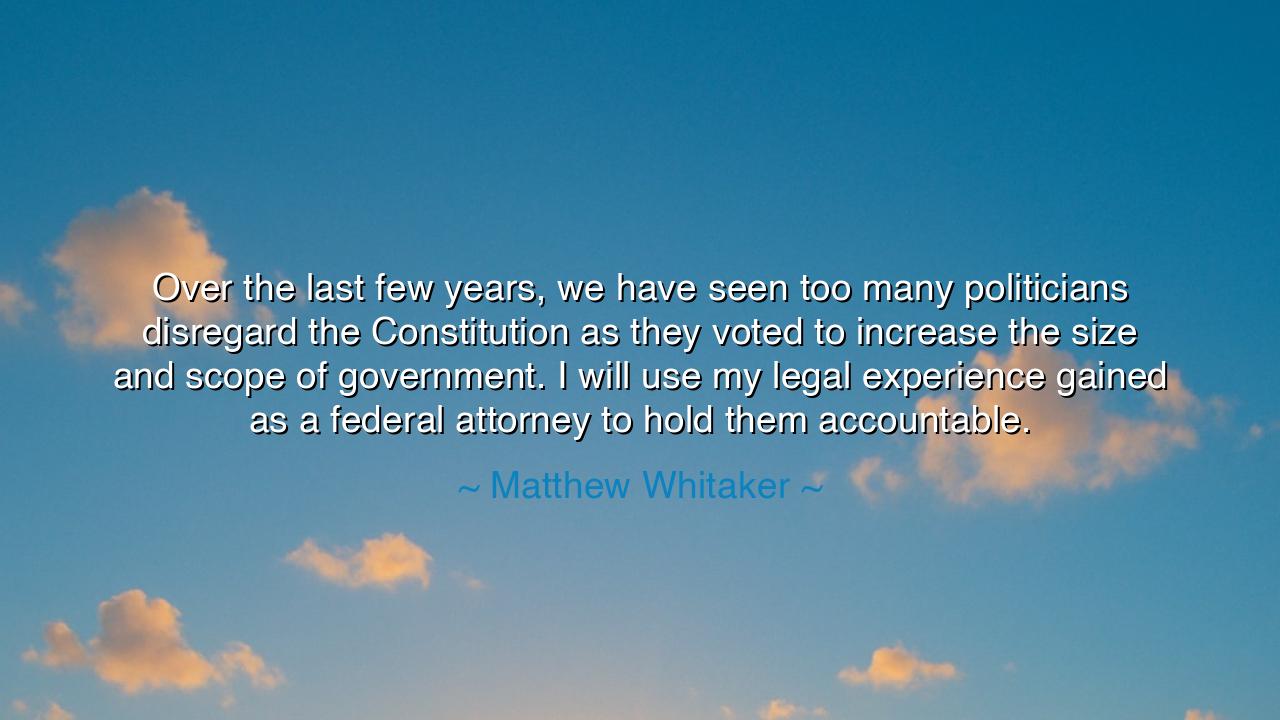
Over the last few years, we have seen too many politicians
Over the last few years, we have seen too many politicians disregard the Constitution as they voted to increase the size and scope of government. I will use my legal experience gained as a federal attorney to hold them accountable.






When Matthew Whitaker declared, “Over the last few years, we have seen too many politicians disregard the Constitution as they voted to increase the size and scope of government. I will use my legal experience gained as a federal attorney to hold them accountable,” he spoke not as a mere public servant, but as a guardian of principle — one invoking the ancient covenant between power and responsibility. His words ring with the tone of duty, of vigilance against the slow decay of liberty that occurs when those entrusted to defend the law begin instead to rule by it. In this statement lies both warning and promise: that freedom, once surrendered to the excesses of authority, is seldom easily reclaimed; and that the true patriot is one who remembers that government exists to serve, not to command.
In the style of the ancients, one might say Whitaker spoke as a sentinel upon the wall — weary of watching the slow creep of power beyond its rightful bounds. His cry is not new; it echoes the wisdom of ages. From the Roman Senate to the American Republic, history has shown that the greatest threat to liberty is not the invader at the gate, but the complacent ruler within, cloaked in noble intentions. To disregard the Constitution is not merely to break a law; it is to wound the sacred trust between the people and their government. The Constitution is more than parchment — it is a moral compass, a living covenant, a flame lit by those who understood that unrestrained power consumes all it touches.
The origin of this quote rests in Whitaker’s background as both attorney and public servant, shaped by years in the practice of law and observation of governance. Having served as a federal attorney, he saw firsthand the delicate balance between justice and authority — how easily rules meant to protect can be twisted to control. His frustration reflects a long-standing concern among constitutional thinkers: that when the state grows too vast, individual liberty shrinks in its shadow. His words are thus not an attack on government itself, but a reminder that even noble institutions must be held to account, lest they drift from their founding purpose — the preservation of freedom under law.
History offers countless lessons in the very danger Whitaker warns of. Consider the fall of the Roman Republic, where leaders, once bound by law and virtue, began to use emergency powers to expand their reach. What began as small exceptions — laws passed for “the public good” — became a habit of rule by decree. Julius Caesar, rising from this culture of unchecked authority, promised to restore order but instead forged empire from liberty’s ashes. The ancients learned, as must we, that freedom is seldom stolen outright; it is bartered away in pieces, each one justified by fear, comfort, or convenience. Whitaker’s words remind us that vigilance is the price of any lasting republic.
His declaration also reflects a deeper philosophical truth: that accountability is the soul of justice. A government that grows beyond its limits becomes not a servant, but a master. It is the duty of those who understand the law — those with both wisdom and courage — to remind the powerful that they, too, are bound by the same principles as those they govern. Whitaker’s promise to “hold them accountable” carries with it the weight of an ancient oath — that no man, however high his office, stands above the rule of law. This is not vengeance; it is preservation — for when law bends to men, tyranny follows close behind.
In a world where ambition often disguises itself as service, Whitaker’s words burn like a torch against the darkness of complacency. The Constitution, he reminds us, is not a relic, but a living defense — a shield for the weak and a restraint for the strong. It demands not worship, but understanding; not blind obedience, but constant guardianship. For freedom, once lost through neglect, cannot be restored by mere sentiment. It requires the hard discipline of citizens who know their rights and leaders who respect their limits.
The lesson of his words is timeless: power must be watched, even when wielded by those who claim to use it for good. The people must be as vigilant as their laws are wise. Let no generation assume that liberty will preserve itself. Each citizen must become, in heart and mind, a defender of the principles that give meaning to freedom. Study the law. Question authority. Demand transparency. For to do less is to betray not only your nation, but your own dignity as a free being.
So, let Whitaker’s message be remembered not as a partisan cry, but as a universal truth: the rule of law is the backbone of civilization, and those who wield power must forever stand answerable to it. When citizens cease to care, rulers cease to be bound. But when courage and conscience unite, even the mightiest empire must bow before the humble word of justice. Guard that word, O generations to come, for it is the breath of liberty itself — fragile, sacred, and worth every struggle to preserve.






AAdministratorAdministrator
Welcome, honored guests. Please leave a comment, we will respond soon